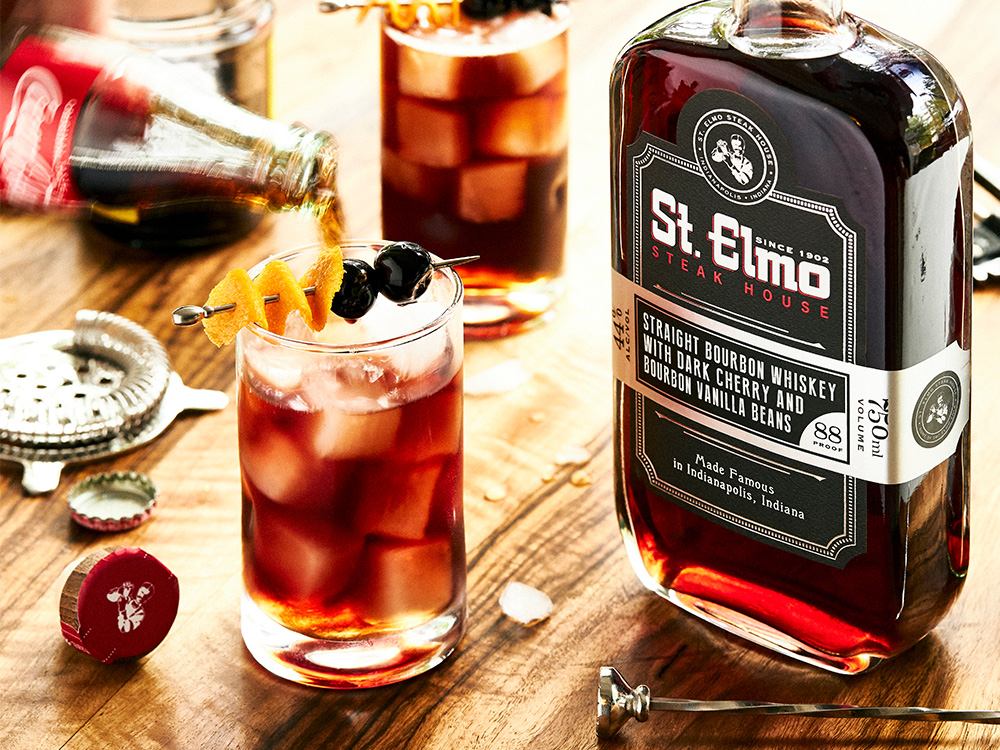January 30, 2020

Kentucky has the Mint Julep. Louisiana has the Sazerac. Wisconsin, the Brandy Old-Fashioned. But, until recently, Indiana lacked a cocktail it could truly call its own, official or otherwise.
In the past few months, however, the Elmo Cola, a highball first served at the historic St. Elmo Steak House in Indianapolis, has taken the state by storm.
Comprising two ounces of bourbon infused with vanilla beans, whole cherries and cherry juice, the drink is topped with Coca-Cola and served over ice in a large tumbler with a cherry garnish. It may sound like a modest affair, but the drink was an instantaneous hit when it was introduced at the 118-year-old steakhouse eight years ago by Tim Kirkland, a visiting hospitality consultant.
The restaurant had hired Kirkland, who works with a number of hotels and restaurant groups, to conduct a training session with the staff. To get more bang for his buck, Craig Huse, co-owner of St. Elmo with his father, Stephen, asked him to hatch some ideas for their cocktail list. One of the drinks Kirkland pitched on the spot became the Elmo Cola.
“It took off very quickly,” says Bryn Jones, vice president of marketing and retail at Huse Culinary. “It was the only drink on the menu that included a portion of our steakhouse name in it, which probably helped. Once guests tried it, it quickly became a favorite.”
Huse estimates that the restaurant now sells 75 Elmo Colas a night. Across the Huses’ five properties (including three locations of Harry & Izzy’s and Burger Study), they sold 5,400 of the $15 cocktail in December alone. It is the restaurant’s best-selling drink.
Now the Elmo Cola, what Huse calls “an adult cherry Coke,” is moving beyond the Indianapolis eateries. Last year, Huse Culinary partnered with Cardinal Spirits in Bloomington, Indiana, to produce a bottled version of the drink. The mixture contains an 88-proof bourbon, similarly flavored with cherry and vanilla. Drinkers then top the whole thing with Coca-Cola at their own discretion.
Cardinal Spirits co-founder Adam Quirk was skeptical of the new product’s reach when Huse first suggested the idea to him. “We do this kind of partnership with a few other companies,” he said. “Everyone has different opinions on how sales are going to go. We’ve gotten used to dialing back expectations.”
But the first 4,700 cases, debuted in October 2019, were quickly bought up by Costco, Kroger, Fresh Thyme, Meijer and other chain markets. Three Indiana Costco stores ordered a pallet each; the supply didn’t last a week. Now, Cardinal is pumping out 3,300 cases a month, and it’s been compelled to hire new workers to handle the output. Quirk recently filed paperwork to begin selling the product in Michigan, too. Kentucky and Ohio will follow.
So, what exactly is the appeal of this very simple bottled drink? “It’s 88 proof,” said Huse. “A lot of these sort of products tend to be flavor forward, but that cherry and vanilla, it’s subtle. It’s not like a 70-proof product that tends to focus on the flavor. It’s a whiskey-forward drink.”
And it appeals to all sorts of drinkers. “What I’m surprised to see is that people who are serious whiskey drinkers seem to enjoy it,” said Huse, “but it also connects with the novice whiskey drinker. It’s almost like a Manhattan.”
Though the bottled version is modeled after the original served at the steakhouse, there are a few points of differentiation between the two. Notably, the restaurant version is made with Maker’s Mark bourbon, but Huse and Quirk opted to source 230 barrels of bourbon from MGP in Lawrenceburg, Indiana. Unlike Maker’s Mark, which is a wheated bourbon, the barrels were filled with bourbon distilled from a mash bill made with 36 percent rye. Quirk found the spicy spirit a better match for the sweetness of the drink. For the cherry component, Quirk uses sweet and sour cherries sourced from Michigan. A touch of molasses is added to mimic the sweetness of the maraschino cherries used in the original.
Despite these changes, Quirk and Huse find that the bottled version matches up well against the house version. In fact, Huse might even like it better. “It tends to be more consistent than what we sell in the restaurant,” he says. “I expect we will roll over to the bottled product eventually.”
The overnight success of the retail Elmo Cola has been such that Huse Culinary and Cardinal Spirits are working on a second collaboration, a ready-to-drink Elmo Cola cocktail in a can, no additional cola necessary.
It’s rare to be able to pinpoint the precise moment that a beloved regional cocktail is born, much less so considering that for more than a hundred years, St. Elmo sold nothing even resembling a signature drink. As Huse observes of the improbability of the drink’s success, “I don’t think we even had a cocktail list until about 12 years ago.” – PUNCH
Read more here